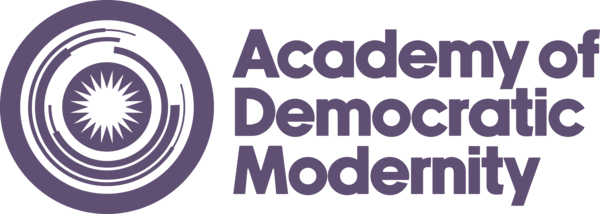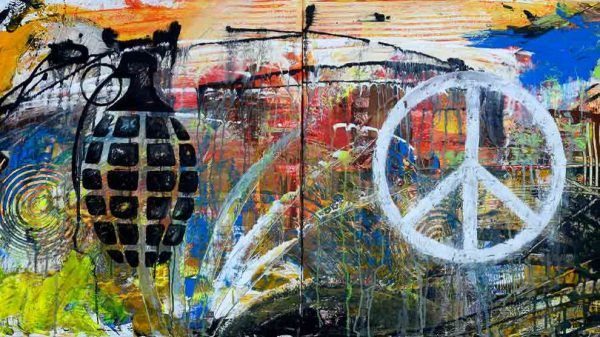“Only self-defense will make peace possible. A peace with no self-defense can only be an expression of submission and slavery. Liberalism today imposes on societies and peoples peace with no self-defense. The unilateral game of democratic stability and reconciliation is nothing but a fig leaf on the bourgeois class domination achieved by the armed forces. It is nothing but a covert state of war. The major plank in capitalist ideological hegemony is the idea that a true peace is a peace that requires no self-defense.“
― Abdullah Öcalan
In the fourth chapter of the book “Sociology of Freedom”, Öcalan deals with the emergence of the so-called social question. In it, he analyses a total of twelve different interwoven problems of society: from power and the state, to ecology, to the question of democracy. With the war in Ukraine, the question of anti-militarism is again a topical issue internationally. In this context, we have already published an excerpt on militarism. We think that Öcalan’s analyses are a valuable contribution to the question of how the democratic forces of society can achieve real peace. The following is another supplementary excerpt with a redefinition of peace and democracy by Öcalan:
Under the previous eleven headings I tried to briefly describe the problems plaguing social nature. Any paradigm or social science will only be of use if it is based on an analysis that takes into consideration the issues raised here and develops responses. Otherwise, there will be nothing to distinguish it from traditional or liberal rhetoric (the art of words that conceal domination). The general conclusion I have reached is that the source of social problems lies in the combined effect, domination, and colonization of the oppressive and exploitative monopolies. They exploit social nature (society’s existence) and in particular the economic resources that generate surplus value. The problems do not arise from nature (first nature) or any social factor (second nature).
Societies cannot survive without social morality and politics, which are factors necessary to their existence (their social fabric) and for addressing society’s common affairs. The natural state of society, its existence, cannot be immoral and apolitical. If a society’s moral and political fabric has not properly developed or has been undermined, distorted, and paralyzed, then it can be argued that society is occupied and colonized by various monopolies, capital, power, and the state among them. To sustain this sort of life is a betrayal of and alienation from its own existence; it is to exist like a herd, like goods, commodities, and possessions under monopoly domination. Under these conditions, society has lost the natural essence and proficiency of a natural society or become obsolete. Such a society has been colonized or, even worse, has become property in every way, leaving itself to decay and poverty. There are numerous societies that fit this definition, both historically and currently. Those that have decayed and been annihilated far outnumber the survivors.
When a society can no longer create and run institutions that provide meaningful moral and political guidance, that society has succumbed to oppression and exploitation. It is in a “state of war.” It is possible to define history as a “state of war” waged by civilizations against society. When morality and politics are dysfunctional, there is only one path open to a society: self-defense. A state of war is nothing more than the absence of peace. As such, only self-defense will make peace possible. A peace with no self-defense can only be an expression of submission and slavery. Liberalism today imposes on societies and peoples peace with no self-defense. The unilateral game of democratic stability and reconciliation is nothing but a fig leaf on the bourgeois class domination achieved by the armed forces. It is nothing but a covert state of war. The major plank in capitalist ideological hegemony is the idea that a true peace is a peace that requires no self-defense. “Sacred concepts” have been used throughout history to express this idea. Religions, in particular civilized religions, overflow with an abundance of such concepts.
Peace is only possible and meaningful if society can defend itself and protect its moral and political character. Peace, particularly the peace that Michel Foucault worked so hard to define, could in this way acquire an acceptable social expression. Peace understood in any other way is nothing but a trap and an implicit state of war on all peoples and communities. In capitalist modernity, the word peace abounds with pitfalls. Using the word without correctly defining it has many drawbacks. Let us redefine peace: peace is neither the complete elimination of the state of war nor stability or the absence of war under the supremacy of one party. There are different parties to any peace, and the complete dominance of one party over another does not and cannot denote peace. Furthermore, weapons will fall silent only when there is acceptance of the functioning of society’s moral and political institutions. The three conditions mentioned immediately above must be met for principled peace. Any other peace would be meaningless.
Let’s elaborate on these conditions; first, a complete disarmament of the different parties is not on the table, but the conflicting parties must vow not to attack one another regardless of the dispute. Military superiority will not be pursued. All sides must accept and respect the right of the other to maintain the means necessary to ensure its security. Second, the ultimate superiority of one party over the others is not at stake. While it is possible to achieve stability and quiescence under the rule of the gun, this cannot be called peace. Peace is only on the agenda when all sides agree to stop the war without one of the parties achieving armed superiority, regardless of whether they are right or wrong. Third, again regardless of the positions of the various sides, they agree to respect the moral (conscience) and political institutions of societies when addressing the problems underlying the conflict. This is the framework of what we call a “political solution.” A cease-fire that does not include a moral and political solution cannot be called peace.
Democratic politics is a central issue for a principled peace. When society’s moral and political institutions are functioning, the natural outcome is the process of democratic politics. Those who want peace must understand that peace can only be attained if politics based on morality play a part. To attain peace, it is essential that at least one side acts on the basis of democratic politics. Otherwise, the sole result will be a “peace game” played in the interests of the monopolies. In that situation, democratic politics plays a vital role. Only dialogue among democratic forces can stand up to power and the state forces and achieve a meaningful peace process. Without such a peace, even if the warring parties (monopolies) silence the weapons for a time, the state of war continues. Of course, there is war fatigue and economic difficulties arising from logistical needs, but as long as these difficulties can be resolved, the war will continue until one side attains unchallenged superiority. The silencing of weapons in this context cannot be called peace but, rather, a cease-fire that portends a fiercer war to come. For a cease-fire to lead to genuine peace the three conditions we have outlined must be met.
On occasion, the side engaged in self-defense (the side in the right) may attain conclusive superiority. This doesn’t change the three conditions for peace. As was seen with real socialism and many legitimate national liberation struggles, immediately establishing your own rule and state to secure stability cannot be called peace. This is just replacing an external monopolistic force with an internal force (state capitalism or a national bourgeoisie). Calling it socialism does not change the basic sociological reality. A principled peace is not something that can be attained by the superiority of power and the state. If power and the state, whatever they call themselves (bourgeois, socialist, national, non-national) do not share their advantages with the democratic forces, then peace will not be on the agenda. In the final analysis, peace is the conditional reconciliation of democracy and the state. History overflows with stories of the many attempts at such conditional reconciliations. There have been principled examples that have endured and others that have collapsed before the ink dried on the treaty. Societies do not only consist of the establishment of power and the state. No matter what restrictions are placed on society, unless it is completely annihilated, it will continue to live in keeping with its own moral and political identity. Although not a focus of written history, this is the essential reality of life.
Society should not be seen as a narrative about power and the state. On the contrary, seeing society as the decisive nature would contribute to the formation of more realistic social sciences. No matter how big or wealthy power and states may become, including capital monopolies (like the pharaoh and Croesus) or their present-day beast-like heirs (the new Leviathan), they can never eliminate society. Because, in the final analysis, it is society that determines them, and those who are determined can never replace those who determine them. Even the present rulers’ spectacular and unsurpassed media propaganda cannot obscure this fact. At the end of the day, they are the most miserable and pitiful of forces playing at being giants. In contrast, human society cannot be stripped of its meaning as the most wonderful creation of nature.

